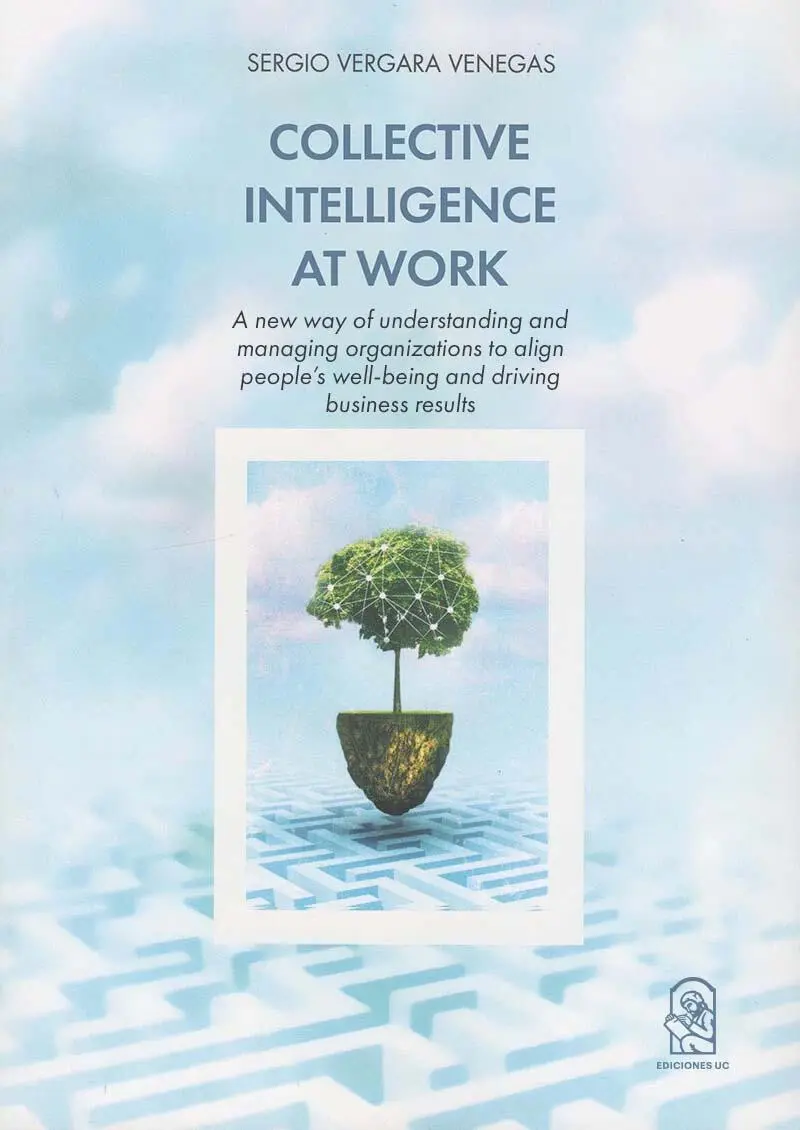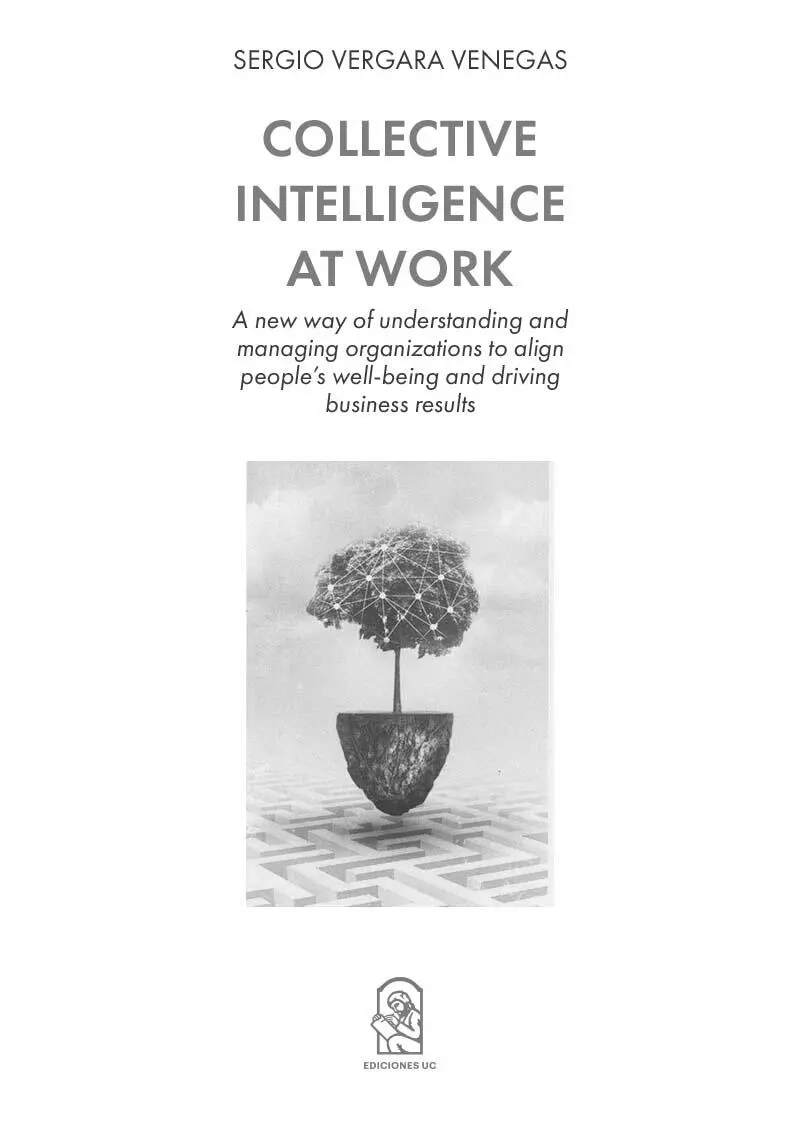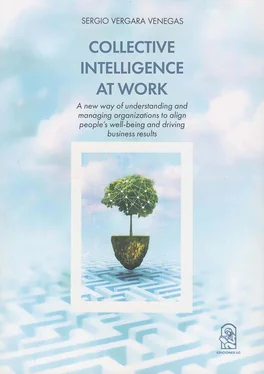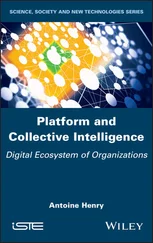
EDICIONES UNIVERSIDAD CATÓLICA DE CHILE
Vicerrectoría de Comunicaciones y Educación Continua
Alameda 390, Santiago, Chile
editorialedicionesuc@uc.cl
ediciones.uc.cl
COLLECTIVE INTELLIGENCE AT WORK
A New Way of Understanding and Managing Organizations to Align People’s Well-Being and Driving Business Results
Sergio Vergara Venegas
ISBN digital: 978-956-14-2872-0
Diagramación digital: ebooks Patagonia
www.ebookspatagonia.com
info@ebookspatagonia.com

TABLE OF CONTENTS
Prologue by Nicolás Majluf
INTRODUCTION
Collective Intelligence
Why Work on Organizational Climate?
Trying to Turn a “Soft” Topic into a “Hard” One
The Influence (and Pressure) Of Social Ranking on the Management of Organizational Climate
The Evolutionary Model of Organizational Climate
CHAPTER 1 COLLECTIVE INTELLIGENCE
Can We Learn to Be Collectively Smarter?
Key Concepts from Chapter 1
CHAPTER 2 THE ORGANIZATIONAL CLIMATE IS A RELATIONSHIP
First Principle of the Evolutionary Model: The Organizational Climate Is a Relationship
Understanding the Management of Organizational Climate as the Management of a Relationship
Organizational Climate versus Organizational Culture: What Is the Difference?
Tool 1: Self-Assessment Survey for Middle Managers and Collaborators
Key Concepts from Chapter 2
CHAPTER 3 FROM THE MOST VISIBLE TO THE LEAST VISIBLE
Second Principle of the Evolutionary Model: What Is Most Visible Is Not Necessarily the Deepest Issue
The Bottom of the Iceberg
Tool 2: Climate Contribution Index of Key Work Activities
Tool 3: Climate Contribution Map of Key Work Activities
Key Concepts from Chapter 3
CHAPTER 4 HOW EVERYONE CAN CONTRIBUTE TO ORGANIZATIONAL CLIMATE IN THEIR OWN WAY
Third Principle of the Evolutionary Model: As in Any Relationship, Managing the Organizational Climate Requires Actions from Different Roles
Senior Management Role
Middle Management Role (leaders)
Individual Role
Tool 4: The Action Plan Model for the Organizational Climate Management That Creates Maturity
Subsystems implicit in the roles
Cases of Dysfunctional Dynamics
Key Concepts from Chapter 4
CHAPTER 5 THE CONCEPT OF MATURITY IN ORGANIZATIONAL CLIMATE
Fourth Principle of the Evolutionary Model: If Relationships Mature, So Does the Organizational Climate Management
Four Stages in the Organizational Climate Management Maturity Pathway
Stage 1: Bewilderment and Frustration
Stage 2: Activism
Stage 3: Understanding
Stage 4: Managing
Key Concepts from Chapter 5
CHAPTER 6 MATURING THE ORGANIZATIONAL CLIMATE MANAGEMENT
The Levers to Make Organizational Climate Mature
Key Levers to Make Organizational Climate Management Mature (the Dos and Don’ts)
Levers between Stages 1 and 2, from “Bewilderment and Frustration” to “Activism”
Tool 5: Meeting Guidelines for Reviewing the Results of the Organizational Climate Survey
Levers Between Stages 2 and 3. From “Activism” to “Understanding”
Levers Between Level 3 and 4. From “Understanding” to “Managing”
Levers to Support Level 4 “Managing”
The Role of Human Capital Management
The Roles for Sustainable Organizational Climate Management
Structure of an Integrated Organizational Management
The Role of Managers
Tool 6: Maturity Diagnostic Instrument
Key Concepts from Chapter 6
CHAPTER 7 THE MINIMUM LEVELS IN ORGANIZATIONAL CLIMATE MANAGEMENT
Fifth Principle of the Evolutionary Model: The Hierarchical Ranking of Organizational Climate Dimensions
Key Concepts from Chapter 7
CHAPTER 8 WORK DYNAMICS AND PRACTICES
Before Changing Practices, Let’s Understand the Dynamics
Improving Practices Strengthens Dynamics
Examples of Good Practices to Improve Organizational Climate
Tool 7: Assessment Matrix of Organizational Climate Improvement Practices
Key Concepts from Chapter 8
CHAPTER 9 THE ORGANIZATIONAL CLIMATE INTERVENTION CONTROL PANEL
Why Have a Control Panel for the Organizational Climate Management Plan?
Control Panel of the Evolutionary Model of Organizational Climate Management
I. Management Model
I.1. Management Practices
I.2. Organizational Structure
I.3. Systems and Processes
I.4. Infrastructure
I.5. Compensation and Benefits
I.6. Business and Human Capital Policies
II. Culture
II.1. Implicit and Explicit Values
II.2. Group and Inter-Area Dynamics
III. Teams
III.1. Maturity of Climate Management in the Area
III.2. Climate Practices Installed
IV. Individuals
IV.1. Profile of the Critical Mass of People
IV.2. Work Maturity of the Critical Mass
Tool 8: Control Panel Checklist
From the Control Panel to the Organizational Climate Management Plan
Tool 9: Climate Maturity Management Plan
CHAPTER 10 INTERVENING WITH THE EVOLUTIONARY MODEL
EPILOGUE ORGANIZATIONAL CLIMATE AND SOCIAL MATURITY
Bibliography
To my children FELIPE and NATALIA, with whom, out of love, I learned to speak languages I did not know. To CARMEN, my wife, for so much, for everything.
FOREWORD TO THE ENGLISH EDITION
There are some books that are of value for being able to summarize some problems that require a specialized technical view. There are books that stand out for their innovation and contribution, and others that are ahead of their time and pose questions for the future. Finally, there are books that manage to interpret the sign of the times and formulate perspectives or tools that are an adaptive response to the current challenges of different disciplines.
It is rare to find a book that is able to bring together the best of these challenges in a single volume. Doing so in a timely manner, in the current difficult times we live in, is a relevant fact that is worth knowing, studying and applying.
The book you are holding in your hands, Collective Intelligence, by Chilean consultant Sergio Vergara, ticks all these boxes. It is the result of mature reflection on specific and long-standing experiences that have transcended the country’s borders.
What emerged as a result of the author’s work with hundreds of organizations and companies of different sizes and complexity, and from different areas of economic activity, and also from his work with the public sector, can today be considered a necessary response to the challenges posed by the social, health and economic crises we’ve been facing for the last two years.
His proposal is so powerful and bold that it translates the best of the economic-business perspectives with the collaborative, dialogical and transformational perspectives that give us new tools for the building of organizational purposes.
Best of all, it provides us with the tools to operate in times of crisis and in the transformation produced by these tools in our organizations and teams.
With deep conviction, but above all with great generosity, this book -originally written in Spanish, in the long strip of the southern part of the American continent called Chile- is a conceptual map and a toolbox that can accelerate the processes of change and systemic transformation that we require.
At times when global citizenship demands new perspectives, when traditional ways of living together, production and working are challenged, at times when the social contract that gave governance to countries, organizations and human groups seems to be under fire and unsuitable to respond to the current times, Collective Intelligence may be the basis of the new modus vivendi of the organizational climate that we urgently need to develop within our institutions.
Читать дальше














